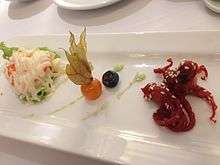octopus
See also: Octopus
English

A southern blue-ringed octopus (Hapalochlaena maculosa, an octopus)
Etymology
From Latin octopūs, from Ancient Greek ὀκτώπους (oktṓpous), from ὀκτώ (oktṓ, “eight”) + πούς (poús, “foot”).
Pronunciation
- (Received Pronunciation) IPA(key): /ˈɒkt.ə.pʊs/, /ˈɒk.tə.pəs/
- (General American) IPA(key): /ˈɑːkt.ə.pʊs/, /ˈɑːk.tə.pəs/
Audio (US) (file)
Noun
octopus (plural octopuses or octopi or octopodes or octopii) (see usage notes)
- Any of several marine molluscs/mollusks, of the family Octopodidae, having no internal or external protective shell or bone (unlike the nautilus, squid or cuttlefish) and eight arms each covered with suckers.
- (uncountable) The flesh of these marine molluscs eaten as food.
- An organization that has many powerful branches controlled from the centre.
Usage notes
- The plural octopi is hypercorrect, coming from the mistaken notion that the -us in octopūs is a Latin second declension ending. The word is actually treated as a third declension noun in Latin. The plural octopodes follows the Ancient Greek plural, ὀκτώποδες (oktṓpodes). The plural octopii is based on an incorrect attempt to pluralise the word based on an incorrect assumption of its origin, and is rare and widely considered to be nonstandard.
- Sources differ on which plurals are acceptable: Fowler's Modern English Usage asserts that “the only acceptable plural in English is octopuses”, while Merriam-Webster and other dictionaries accept octopi as a plural form. The Oxford English Dictionary lists octopuses, octopi, and octopodes (the order reflecting decreasing frequency of use), stating that the last form is rare. The online Oxford dictionary states that the standard plural is octopuses, that octopodes is still occasionally used and that octopi is incorrect.
- The term octopod (both octopods and octopodes can be found as the plural) is taken from the taxonomic order Octopoda but has no classical equivalent, and is not necessarily synonymous (it can encompass any member of that order). The collective form octopus is usually reserved for animals consumed for food.
Synonyms
Translations
mollusc
|
|
Dutch
Etymology
From Ancient Greek ὀκτώπους (oktṓpous), from ὀκτώ (oktṓ, “eight”) + πούς (poús, “foot”).
Pronunciation
Audio (file) - Hyphenation: oc‧to‧pus
Latin
Etymology
From Ancient Greek ὀκτώπους (oktṓpous, “eight feet”).
Pronunciation
- (Classical) IPA(key): /okˈtoː.puːs/, [ɔkˈtoː.puːs]
Noun
octōpūs m (genitive octōpodis); third declension
Inflection
Third declension.
| Case | Singular | Plural |
|---|---|---|
| Nominative | octōpūs | octōpodēs |
| Genitive | octōpodis | octōpodum |
| Dative | octōpodī | octōpodibus |
| Accusative | octōpodem | octōpodēs |
| Ablative | octōpode | octōpodibus |
| Vocative | octōpūs | octōpodēs |
This article is issued from
Wiktionary.
The text is licensed under Creative
Commons - Attribution - Sharealike.
Additional terms may apply for the media files.
